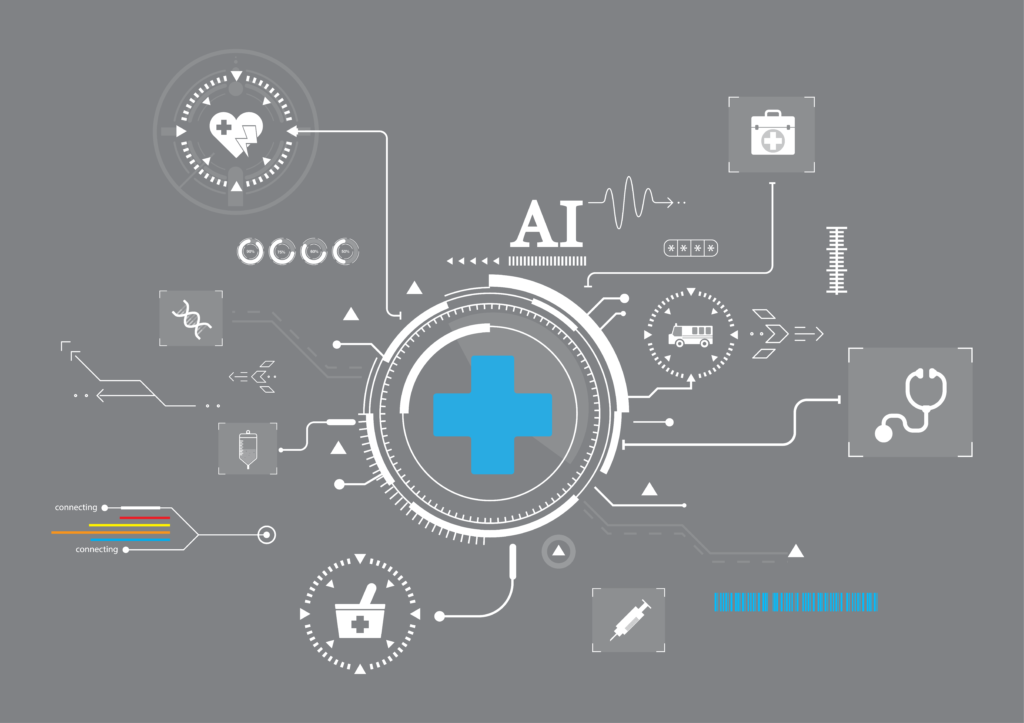
Healthcare systems worldwide are facing unprecedented challenges, from ageing populations to the growing burden of chronic diseases, coupled with rising healthcare costs. In this landscape, the healthcare sector is under pressure to innovate and meet the “quadruple aim”: improving population health, enhancing the patient and caregiver experience, and reducing costs. The COVID-19 pandemic has further highlighted gaps in the healthcare workforce and inequities in care access, underscoring the need for transformation. In this context, Artificial Intelligence (AI) emerges as a transformative technology that could revolutionize the way healthcare is delivered.
AI in Healthcare: The Promise of a Revolution AI’s potential to reshape healthcare is immense. By leveraging vast amounts of multimodal data—including genomics, clinical, demographic, and economic data—AI can improve patient care, streamline healthcare operations, and drive more efficient, data-informed decision-making. Technologies like cloud computing and AI-powered systems can enable faster data analysis, leading to significant improvements in healthcare delivery. The rise of AI in healthcare coincides with the rapid expansion of cloud computing, which offers unparalleled computing capacity for large-scale data analysis at reduced costs.
Tech leaders like Microsoft’s Satya Nadella and Apple’s Tim Cook have emphasized AI’s potential to transform healthcare, describing it as a critical application of AI in modern times. AI is not just about automation; it’s about augmenting healthcare professionals’ ability to make better decisions, improve patient outcomes, and provide more personalized care.
What is AI and How Does It Work in Healthcare? AI refers to the ability of machines to mimic human cognitive functions such as learning, problem-solving, and decision-making through algorithms. Machine Learning (ML) and Deep Learning (DL) are two key subsets of AI that are particularly impactful in healthcare. ML enables computers to learn from data and improve over time, while DL involves deep networks of algorithms capable of processing vast datasets to identify patterns and make predictions.
AI can process large volumes of multidimensional data and recognize intricate patterns that may not be visible to the human eye, thus enhancing diagnosis, treatment planning, and patient care. For instance, AI systems could evaluate a patient’s entire medical record and offer predictive insights into their health outcomes, helping clinicians make more informed decisions.
Building Effective AI-Augmented Healthcare Systems Despite the promise of AI, the adoption of AI in clinical practice has been slow, with many AI solutions still in the developmental stage. The key to success lies in understanding that AI is meant to amplify, not replace, human intelligence in healthcare. AI solutions must be designed with a deep understanding of clinical workflows, user needs, and safety. A human-centered approach to AI ensures that technology complements the doctor-patient relationship, rather than disrupting it.
To build effective AI systems, collaboration between healthcare professionals, data scientists, and technology developers is essential. Multi-disciplinary teams must define problems, set clear goals, and continuously refine AI tools through experimentation and feedback from real-world clinical settings. Evaluating AI systems through real-time data and iterative testing will ensure they are safe, reliable, and provide tangible clinical benefits.
The Road Ahead: AI’s Role in Precision Medicine The future of AI in healthcare is not just about automation, but precision. AI will drive the transition from a one-size-fits-all approach to personalized medicine. In the short term, AI can help automate repetitive tasks and assist in diagnostic imaging, improving efficiency. In the medium term, AI’s ability to analyze diverse data sources—such as electronic health records, imaging, and multi-omics data—will enable more precise diagnostics and targeted treatments.
Looking further ahead, AI could revolutionize drug discovery, personalize therapeutic strategies, and help design individualized treatment plans. Through innovations like CRISPR gene editing, AI has the potential to transform how we approach disease at the molecular level. As AI systems become more intelligent, they will enhance clinicians’ ability to deliver care that is not only more effective but also more efficient.
AI in Action: Real-World Applications Several AI applications are already making a significant impact in healthcare, particularly in diagnostics and therapeutics. For example, AI systems are being used to diagnose diabetic retinopathy and assist in radiotherapy planning, dramatically reducing preparation times and improving patient outcomes. AI’s role in medical imaging is particularly notable, with deep learning algorithms outperforming radiologists in certain diagnostic tasks, such as detecting pneumonia or classifying skin lesions.
As AI systems continue to evolve, their impact will only grow. Future applications include autonomous virtual health assistants that deliver predictive and preventative care, and AI-driven tools that will aid in personalized medicine, such as genetic and molecular profiling of patients.
Challenges in Implementing AI in Healthcare While the potential of AI is clear, there are significant challenges to overcome. Issues related to data quality, access, and privacy remain barriers to widespread AI adoption. Additionally, the healthcare workforce must be equipped with the necessary digital skills to leverage AI effectively. Healthcare systems will also need to invest in the technical infrastructure necessary to support AI solutions at scale.
Ethical concerns, including data security, patient privacy, and the potential for AI to reinforce biases in healthcare, must also be addressed. Ensuring that AI tools are transparent, accountable, and used responsibly will be critical in securing trust and fostering wider acceptance.
The Future of AI-Augmented Healthcare AI is poised to be a game-changer for healthcare, improving the accuracy of diagnostics, personalizing treatments, and enhancing the overall patient experience. As we move forward, the healthcare sector must embrace AI’s potential while addressing the technical, ethical, and infrastructural challenges that come with it. By doing so, AI can unlock new levels of care, enhance efficiency, and contribute to more equitable healthcare systems worldwide. The next decade will be critical in determining how AI will reshape the landscape of healthcare, and the innovations we see today will lay the foundation for the future of medicine.
Keywords: AI, digital health, healthcare innovation, machine learning, precision medicine, AI healthcare systems




